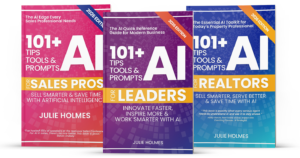Ever followed your GPS so religiously that you couldn’t retrace your steps if your life depended on it?
Same.
Now imagine that – but for writing, decision-making, or critical thinking. That’s the concern behind a recent MIT study making waves in the AI world: using tools like ChatGPT for writing tasks can lead to something they call “cognitive debt.” Essentially, we’re outsourcing so much thinking to AI that we may stop flexing those mental muscles ourselves.
Sounds scary, right?
Here’s the good news: this isn’t new. And it’s not even uniquely AI’s fault. If you’ve ever relied on autocorrect, Google, a calculator, or even sticky notes, congratulations – you’ve been cognitively offloading for years.
"AI might be the intern, but you’re still the brain on the team.”
As an AI keynote speaker, I see this tension a lot: the fear that AI will make us lazy.
But here’s the truth – tools don’t create decline. Passive use does. Let’s break this down and, more importantly, figure out how to stay sharp while still getting the AI boost.
This Isn’t AI’s First Rodeo: Tech Has Always Outsourced Thinking
Let’s take a quick tour through our mental muscle atrophy museum:
- GPS & Navigation Skills: Studies show long-term GPS use weakens spatial memory. Your brain literally builds fewer mental maps when you let your phone lead.
- Spellcheck & Autocorrect: Great for typos, not so great for spelling fluency. Overreliance can reduce spelling accuracy and writing confidence. And we’ve all had that moment when autocorrect turns “best regards” into “beet ragards” and you hit send anyway.
- Calculators & Arithmetic: Kids (and adults) who rely too heavily on calculators tend to lose mental math fluency.
- Google & Memory: The “Google Effect” shows that when we know we can look something up, we’re less likely to remember it. Convenient? Yes. Brain-building? Not so much.
Even seemingly harmless tech, like digital reminders, can short-circuit memory formation by letting our brains opt out of retention (PMC study).
So yes, AI can do the same thing. But the issue isn’t the tools. It’s what we do with them.
ChatGPT Isn’t the Culprit - Overdependence Is
In the recent MIT paper, researchers found that low-performing learners offloaded their thinking to AI without much reflection. They accepted outputs at face value, skipped critical edits, and their skills suffered.
In contrast, high-performing learners used AI strategically. They guided it, edited actively, asked better questions, and ultimately wrote better essays – and retained more of what they learned.
Sound familiar? It should. This is the very heart of my 20-60-20 approach to using AI:
- 20% Preparation.
- 60% Prompting.
- 20% Post-prompting review.
If you’re using AI like this, you’re collaborating – not offloading. That’s not cognitive decline. That’s AI-empowerment.
“The 20-60-20 model gives you the rhythm of real AI empowerment: reflect, engage, review.”
Use the AI Time Dividend Wisely
Here’s the thing most folks miss in these debates: AI gives you back time.
The question is: what are you doing with it?
Too often, we save 45 minutes on a draft and then fill that time with email sludge. But the best teams—the most AI-empowered ones – use that time for strategy, innovation, customer relationships, or personal development.
If AI saves you an hour and you spend it doom-scrolling LinkedIn, that’s not a time dividend – that’s a time refund request.
AI can handle the repetitive and the routine. But only you can do the bold, the nuanced, the truly human.
Stay Sharp: Five Ways to Lead Your Brain (and Your Bot)
Want to avoid becoming a cautionary tale? Start here:
- Think before you prompt. Get clear on what you want first. That’s your prep zone.
- Collaborate, don’t copy-paste. Interrogate, edit, and rework your AI outputs.
- Use the 20-60-20 rhythm. Build it into your daily habits – AI isn’t plug-and-play. It’s poke-and-tinker.
- Alternate between AI-on and AI-off sprints. Test your brain. Let it stretch.
- Use the PREPARED Prompting framework. Give AI a role, goal, context, and structure—and you’ll get better results and better thinking.
And when in doubt? Pretend you’re mentoring your AI intern. They need guidance, feedback, and critical thinking. Just like any good team member.
Final Thought: AI Isn’t a Shortcut - It’s a Skillset
Let’s stop blaming the tool. The calculator didn’t kill our math skills. GPS didn’t ruin our brains. And ChatGPT won’t destroy our critical thinking… unless we let it.
We’re at a turning point – not just in technology, but in how we choose to partner with it.
“AI isn’t here to do your job. It’s here to give you back the hours so you can do your best work.”
Ready to Build Smarter Thinkers with Smarter Tools?
If your team is exploring AI – or already using it without a strategy – let’s make sure you’re building capabilities, not just convenience.
I work with organizations across finance, healthcare, logistics, and professional services to turn overwhelmed teams into AI-empowered thinkers.
Want to explore a talk, workshop, or strategy session? Let’s talk.




